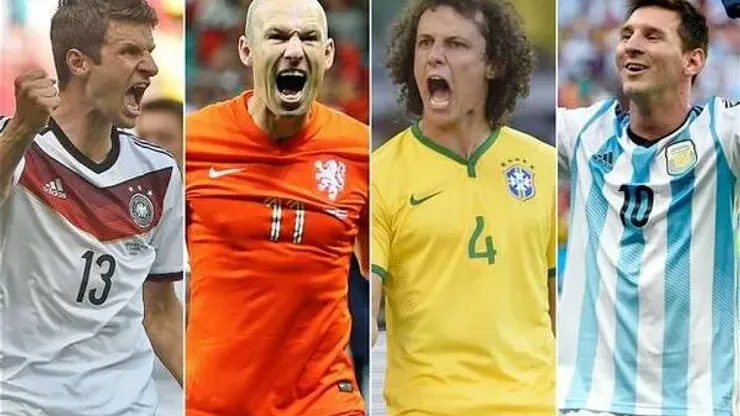It’s getting closer, much closer. Today and tomorrow will decide who will meet each other in the 2014 World Cup final in Brazil. Four teams, four nations, are still in the race. Before the tournament, Brazil were red hot favorites. They still are. Apart from that, it is no surprise that Argentina and Germany are among the semifinalists. Perhaps it is a little surprising to find Holland still competing for the trophy. Before the tournament, nations like Italy, Spain and France may have held a bigger chance, at least if the bookies were asked. But the fact is, that the next World Champion will be found among Brazil, Argentina, Germany and Holland.
With globalization and mass migration the defining features of our epoch, the idea that continents and nations have certain characteristic and long-standing traditions of playing styles has been challenged within recent years. However, I would still argue that you see two widely different approaches when you look at the South American teams Brazil and Argentina compared to the European teams Germany and Holland. While you may detect differences – huge differences – between Argentina and Brazil as well as between Germany and Holland, there is a fundamental difference between the styles of the two South American and the two European teams. Basically, it comes down to individualism (with a strong collective ethos) versus collectivism (with a strong individualistic component).
Argentina and Holland are probably the most obvious examples of this. It hasn’t been a secret to anyone that so far Argentina have (much too) heavily relied on Lionel Messi’s individual strokes of genius. The team has played poorly. Marc Wilmots, the Belgian coach, said after their quarter final defeat to Argentina that the South American team was “ordinary”. He is right. But with Messi, anything can happen. Even Alejandro Sabella, their own coach, admits that sometimes they just play and hope Messi will do the trick for them. So far it has worked, but my guess is it will not take them all the way.
With Holland, we see a totally different approach. Even with superstars such as Robin van Persie, Arjen Robben and Wesley Sneijder, Louis van Gaal, the Dutch coach, has opted for an approach based on a solid defensive formation with collectivism, caution and counter attack being the main characteristics. Van Gaal hasn’t been afraid of changing his formation and tactics during the World Cup, often proving himself to be a tactical genius. Perhaps the match against Chile was the clearest example of his flexibility and tactical awareness as the Chileans were completely neutralized. In every match Van Gaal has shown us a masterplan – not just a masterplan in which he relies on a Messi, a Van Persie or a Robben, but a masterplan involving the whole team (even the bench, indeed the bench, from field players to goalies).
Brazil’s hopes of winning the World Cup has (as always one is tempted to say) relied much on their number 10, Neymar. In that sense, Argentina and Brazil are similar. However, the Brazilians have looked stronger than Argentina with more players able to contribute going forward (and their two central defenders able to score vital goals). But still their approach is based more on individual actions, less on team “automatisms.” Contingency and not pattern seems the dominant trait of their attacking style. Of course, Brazil is still playing on home soil, and the team – as for example in the game against Colombia – looks almost infused with energetic frenzy, and even without Neymar this may take them a long way. But as with Argentina, I don’t think they will be able to go all the way.
Germany may lack what Holland and Argentina have: a Messi or a Van Persie, that is, a proven goal scorer whose efficiency is very high. Miroslav Klose is not what he used to be, and Thomas Müller may be very adaptable, but he is not Gerd Müller. But you see a team plan when you watch the Germans. And you see a team who is meant to culminate in this tournament. Germany have individuals able to make the difference – Götze, Özil, Kroos – and at the same time they have a team unit based on organization (in defense) and patterns and automatisms (when attacking).
While (bad) luck will almost always play a significant role in knock out stages (just ask Chile and Pinilla), thus making it very difficult to predict a winner at this stage, my guess is that the Europeans will prevail because of their greater tactical acumen and collective ethos. Argentina and Sabella look planless, even with Messi. Brazil without Neymar, but on home soil, is a strong contender, but their game plan is a little too dependent on individual actions, a little too contingent. Germany look very strong and history is on their side – they do lack a real goal scorer, though. Holland with the tactical genius of Van Gaal, the speed and dribbling of Robben and the efficiency of Van Persie will be my bet on the next World Champions – even though history is not on their side.
Editor’s note: Søren Frank is author of Standing on the Shoulders of Giants, which is available from all fine booksellers.
200+ Channels With Sports & News
- Starting price: $33/mo. for fubo Latino Package
- Watch Premier League, Women’s World Cup, Euro 2024 & Gold Cup
The New Home of MLS
- Price: $14.99/mo. for MLS Season Pass
- Watch every MLS game including playoffs & Leagues Cup
Many Sports & ESPN Originals
- Price: $10.99/mo. (or get ESPN+, Hulu & Disney+ for $14.99/mo.)
- Features Bundesliga, LaLiga, Championship, & FA Cup
2,000+ soccer games per year
- Price: $5.99/mo
- Features Champions League, Serie A, Europa League & Brasileirāo
175 Premier League Games & PL TV
- Starting price: $5.99/mo. for Peacock Premium
- Watch 175 exclusive EPL games per season






